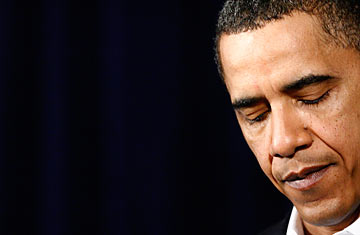
(2 of 6)
Now, I've given you three big reasons why this was so tough. Having said all that, I think we're going to get it done. And I think this is going to be a framework that allows us to genuinely say that every American is going to have access to quality, affordable health care. And that people who have health care have security in the coverage that they've purchased. That is an enormous accomplishment, and the thing that I'm most proud of is that not only will we have dealt with access, not only will we have dealt with accountability when it comes to insurance companies, but when all is said and done, this offers our best chance at significant deficit reduction, of any of the other options that are out there.
But it comes with a high opportunity cost, given the political hot spot of the moment. Say you're sitting in Belmont, Mass., or Needham, and you're watching the unions get their deal and Nebraska get its deal and everybody else get their deals. What would you say to that person, who probably voted for you because you promised change and — I was just reading David Plouffe's book [The Audacity to Win] — the emphasis on going after the special interests? But you've made deals with all the special interests to get this done.
Well, I'll tell you what, Joe. What I would say is, If you look at this bill when it is said and done — not where it was coming out of one committee or where it was coming out of another committee, but the bill that I actually sign. I think what you're going to see is that there have been very few instances where something of this magnitude had relatively few provisions in there that weren't for the broad public. Getting something through 535 members of Congress involves some trade-offs.
When I promised change, I didn't promise that somehow members of Congress weren't going to be looking to try to get a project in their district or help a hospital in their neighborhood. What I promised was that this White House was going to constantly be pursuing the people's interests. And this bill will pass that bar by a mile.
One last thing I'll say about this: There is no doubt that politically speaking, having this intense a focus on the sausage-making process in Congress is never helpful.
But it's impossible to avoid.
It's impossible to avoid if you're trying to do big stuff. Now it is even more difficult in a 24-hour news cycle. I have no idea what Lyndon Johnson had to do to get the Civil Rights Act done. Or if I have an idea, it's because I read Robert Caro's biography 40 or 50 years later. So that process is one that people have legitimate concerns about. And one of the things that I think is very important for us to do moving forward on financial reform, on energy legislation, on the jobs package that we're going to put forward, is we've got to do a better job highlighting what's good in these measures.
